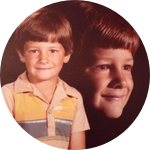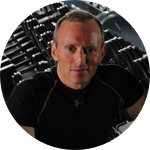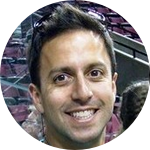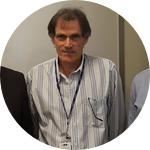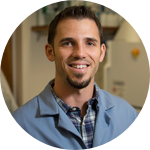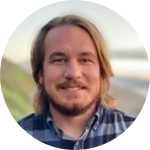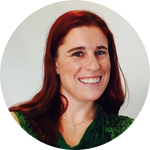About This Project
Ever wondered why some people build muscle faster than you? We know some people have more fast-twitch muscle fibers than others and muscle adaptations are regulated by your myonuclei (the cell components responsible for DNA replication, transcription, and protein synthesis). Thus, we believe the number of myonuclei differs between fiber types, and this explains much of how and why muscle grows and recovers at different rates between people, and between exercise programs!
Ask the Scientists
Join The DiscussionWhat is the context of this research?
Your muscles are made of billions of individual cells (myofibers). Unlike most cells, human myofibers have thousands of microscopic organelles (myonuclei) that hold your unique DNA sequence. They also regulate myofiber growth (hypertrophy), shrinking (atrophy), repair, or even death. The abundance of myonuclei allows massive hypertrophy (they are the largest mammalian cells) and gives us unparalleled adaptability. The adaptation depends on the exact challenge (strength vs. endurance exercise, extensive inactivity like spaceflight, etc.), and “type” of fibers in the muscle (fast vs. slow-twitch). Unfortunately, fiber type-specific myonuclear characteristics are poorly understood, so we want to measure it by taking biopsies from a range of people!
What is the significance of this project?
We’ll gain a deeper understanding of myonuclei in healthy, high-functioning humans. Understanding the molecular mechanisms of muscle growth/wasting extends far beyond sport performance or aesthetics. Muscle functions as a metabolic reservoir (stores most of the body’s protein) and endocrine organ (controls hormone activity). More importantly, muscle massand leg power/strength are among the strongest predictors of all-cause mortality! Our team is uniquely equipped due to our rare mixture of passion and expertise in the areas of human performance, molecular biology, strength and conditioning, and confocal microscopy. Combined with our love for helping people, we are obligated to do this for you. It is our number one priority.
What are the goals of the project?
We will take muscle biopsies from the thigh (quadriceps) of people across a spectrum of physical abilities (sedentary, recreationally active, weekend warriors, and Olympic Gold Medalists) - a standard practice in our lab. Thousands of individual myofibers will be isolated and split in half. The first half will be analyzed with SDS-PAGE to determine the fibers “type” (fast-twitch, slow-twitch, or “hybrid”). We’ll then use a laser scanning confocal microscope to measure the size and myonuclear content of the remaining half. We believe science should be for the people. Thus, we will publish the results in high-quality peer-reviewed, open access research journals, meaning it is free for you! We plan on starting December 2016 and anticipate having results by Summer 2017.
Budget
We self-funded a pilot study (check out our cool images!) to optimize our methodologies. However, the laser scanning confocal microscope used during our pilot study costs ~$500,000 to purchase. We can rent the microscope for ~$40/hour, but there are such limited rental hours our study would literally take years to complete. To save money and time, Dr. Bagley spent the last 2 years building our own fluorescence microscope; with just another $12,500, we can finish it. Once that is done, we won’t need to rely on anyone else’s equipment and can do exponentially more work. The remaining funds are needed for biopsy supplies to ensure participant safety; as well as for the chemicals, reagents, and general laboratory supplies needed to run the fiber type experiments, process, and store muscle samples. With your help, we won’t have to seek funding from government agencies or for-profit corporations. If you pay for it, you control it, so we’ll do it with your best interests in mind.
Endorsed by
Meet the Team
Affiliates
Team Bio
Jimmy and Andy met as PhD students, and Irene joined the team after listening to Andy on Barbell Shrugged. The group has a unique combination of world-class experience across the spectrum of human performance and highly sophisticated laboratory skills (muscle mechanics, molecular biochemistry, etc.). The team works so well together because they share an unrelenting and burning desire to do high-quality science, and to ensure it is translatable, tangible, and tactical for all.
Andy Galpin, PhD
I’m Andy, a tenured Professor at CSUF in the Center for Sport Performance. I’m also the director of the Biochemistry and Molecular Exercise Physiology Lab and advisor of the CSUF Weightlifting Club. I started in this field by trying to become the best middle school, and eventual college, football player (Linfield College) I could be. After earning my BS (Exercise Science), I spent time training professional athletes (NFL, MLB, etc.) before pursuing my MS in Human Movement Sciences from U. of Memphis. Along the way, I’ve trained and competed in (Olympic) Weightlifting and various combat sports. I culminated my education by studying single muscle fiber protein expression in old and young elite athletes, which earned me a PhD in Human Bioenergetics from Ball State University. I’ve published hundreds of articles, abstracts, and other scholarly work, and been featured on radio stations, TV shows, podcasts, and other media. For more info, follow my research (@DrAndyGalpin) or visit my website (www.andygalpin.com) where I give free lectures.
Jimmy Bagley, PhD
I’m Jimmy, a tenured Associate Professor of Kinesiology at San Francisco State University. I'm Director of the Muscle Physiology Lab, Co-Director of the Exercise Physiology Lab, and work as a Visiting Research Scholar in Dr. Andy Galpin's Lab at Cal State Fullerton. At SF State, I teach graduate/undergraduate courses in exercise & movement science. My Lab's research aims to help elucidate muscle plasticity (hypertrophy/atrophy) mechanisms using novel 3D imaging methods in athletes, "healthy adults", and individuals with disease/disability. My passion for studying the human body began with a basic physiology course while I was a collegiate athlete (swimming and water polo). I became extremely fascinated with the science behind human performance and went on to earn a BS in Kinesiology (Cal Poly-San Luis Obispo), MS in Kinesiology (Cal State Fullerton), and PhD in Human Bioenergetics from the Human Performance Laboratory at Ball State University. I’ve published over 100 peer-reviewed articles, abstracts, and book chapters in the fields of strength & conditioning, muscle biology, and exercise physiology. I'm also an active member of the American Physiological Society (APS), American College of Sports Medicine (ACSM), and National Strength and Conditioning Association (NSCA). Follow our Lab’s research and stay informed about upcoming FREE guest lectures and seminars (@MusclePhysLab).
Irene Tobias, PhD
I’m Irene, and I’m the newest member of the team! I earned my BS in Materials Science and Engineering and my M.Eng in Biomedical Engineering degrees from MIT. I recently completed my PhD at UCSD in Biomedical Sciences, focusing on the biochemistry of cell signaling pathways. While my journey in science thus far has taken me through several research areas (biomaterials, drug delivery devices, pharmaceutical formulations for novel cancer drugs, and mechanisms of protein kinase activation), I believe I’ve found my current niche in studying the molecular adaptations of human performance as a post-doctoral researcher with Dr. Galpin. I’m fascinated by this area of research and am excited to finally blend my professional biochemistry expertise with my personal fitness interests. I’m passionate and curious to better understand the molecular adaptations to intense training regimens. I train regularly at Crossfit Invictus in San Diego and compete in both powerlifting meets and short distance triathlons. For more info and a list of publications, see my LinkedIn profile (https://www.linkedin.com/in/ir...) and my social media (Instagram: @drirenetobias).
Additional Information
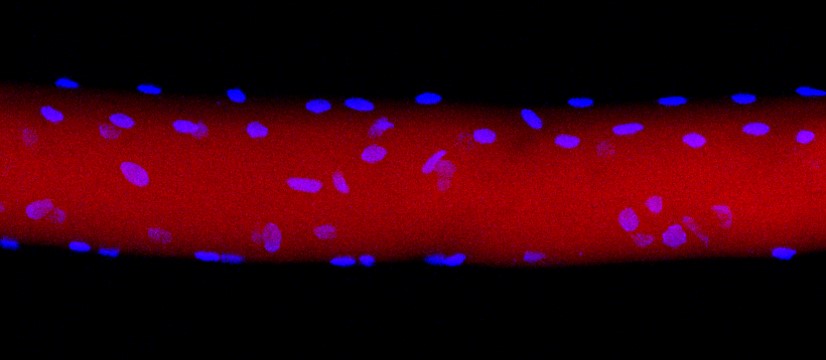
Project Backers
- 133Backers
- 100%Funded
- $17,500Total Donations
- $131.58Average Donation
